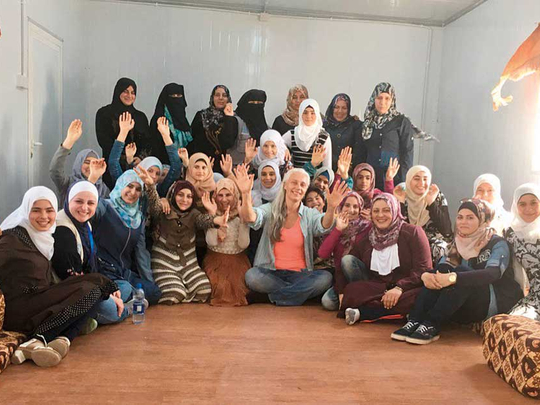
Dubai: To mark World Refugee Day on June 20, NRS International and professor Helen Storey, a social artist at the London College of Fashion, are launching the ‘#LoveCoats’ project to empower girls of Zaatari refugee camp in Jordan from July 9-17.
The #LoveCoats concept was created in collaboration with Tiger (These Inspiring Girls Enjoy Reading) Girls and taken forward in Dubai during the annual Dubai International Humanitarian Aid and Development Conference and Exhibition (Dihad) in March.
The collaboration invites Tiger Girls in Zaatari refugee camp to participate in the #LoveCoats project. It aims to empower 1,250 adolescent girls through fashion and design and plans to develop their technical skills to make clothes to battle the next winter.
A girl from the Zaatari refugee camp in Jordan dressed in a coat designed under the #LoveCoats programme. |
“If hope is what we need in the world, then working with the Tiger Girls of Zaatari is where you can find it. From the moment I first met them and their coaches, it was clear that here, against all the odds, was female spirit and endeavour in abundance,” said Storey.
She explained the girls “aim high, as they should, and anything we can do to continue to enable and help them reach their full potential as young women will serve us all”.
Through the #LoveCoats project, the design workshops will foster a creative learning environment for the Tiger Girls. They will have the opportunity to enhance their clothing design skills and pass it on to the younger girls — creating a legacy that will last for years. Both parties are also looking at a possible partnership with UAE Fashion Week in order to present various designs of the #LoveCoats on the catwalk in Dubai.
Farhaj Sarwar, managing director of NRS International, said he was inspired by Storey’s previous projects that use the power of fashion to address the world’s most pressing issues.
“Professor Storey explained the fear of the refugee girls of being cold in winter. This led to our collaboration, which is in line with what we offer as a company, namely relief items. It was only a natural response to provide the blanket material. We are hugely impressed with the transformation of how one blanket can become so fashionable,” Sarwar said.
As part of the UAE Year of Giving, NRS International donated 1,000 metres of thermal blanketing material to Storey. The durable material meets UN refugee agency specifications. In 2016, NRS International sold 3.9 million of these blankets to leading aid agencies worldwide.
World Refugee Day 2017
World Refugee Day was first marked in 2001. The annual event is marked by a variety of events in over 100 countries, involving government officials, aid workers, celebrities, civilians and the forcibly displaced themselves. Syria’s conflict remains the world’s biggest producer of refugees (5.5 million). However, at the end of 2016, the biggest new factor was South Sudan, where the disastrous breakdown of peace efforts in July of that year contributed to the outflow of 739,900 people by year’s end (1.87 million today).
In numbers
65.6 million people around the world are displaced by crisis. This comprises:
22.5 million refugees (the highest ever), over half of whom are under the age of 18
40.3 million stateless/internally displaced people
2.8 million asylum seekers.
This means that on average, 1 in every 113 people worldwide is displaced — a population bigger than that of the world’s 21st most populous country, the United Kingdom.
20 people are forcibly displaced every minute as a result of conflict or persecution.
55% of refugees worldwide come from three countries:
Syria: 5.5 million
Afghanistan: 2.5 million
South Sudan: 1.4 million
Where the displaced are being hosted
Turkey: 2.9 million
Pakistan: 1.4 million
Lebanon: 1 million
Iran: 979,400
Uganda: 940,800
Ethiopia: 791,600
Source: www.unhcr.org/globaltrends2016/








